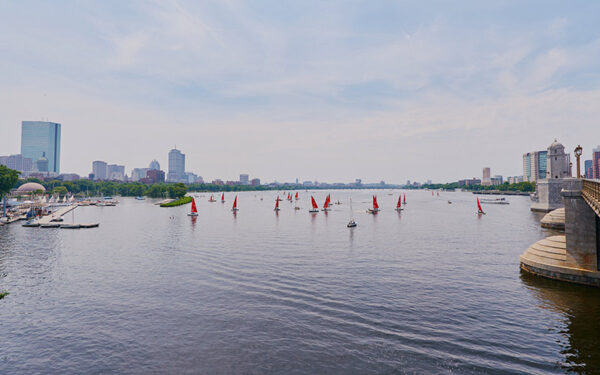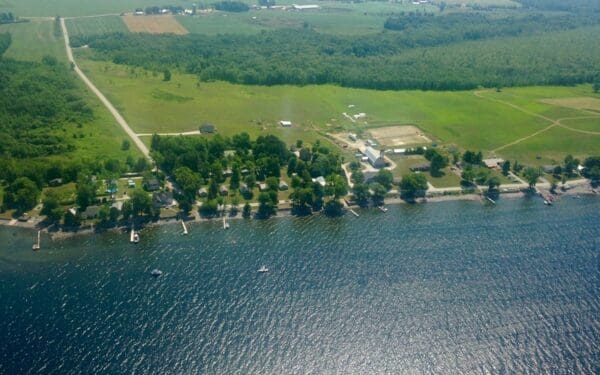
Kayakers enjoy the Great Bay estuary. Photo: Melissa Paly
CLF and communities across the Seacoast know the Great Bay estuary is special. It’s where we love to kayak, where our local oysters come from, where we can hike and see ospreys fishing and eagles soaring. To protect the estuary, CLF and several communities have been tackling the most significant direct sources of water pollution – sewage treatment plants. And thanks to stronger permits and investments by communities like Durham, Newmarket and Exeter, we’re making progress.
But now that progress could be undermined. Eversource Energy wants to build a new transmission line through the estuary, plowing through Little Bay and putting the health of the estuary at risk. We’re concerned – as are countless Seacoast residents – and are fighting to ensure the estuary’s health.
Plowing through Little Bay Will Stir Up Problems
The Seacoast Reliability Project would run a 13-mile electric transmission line from Madbury, New Hampshire, to Portsmouth. The proposal calls for burying three submarine cables across Little Bay, in the heart of the Great Bay estuary. And it proposes doing so with a “jet plow” – an operation that will release approximately 1,500 tons of sediment into the bay’s tidally dynamic waters.
Plowing through Little Bay will release – along with those sediments – a significant amount of nitrogen, which is the pollutant of greatest concern for the estuary. Experts presented by the Town of Durham estimate the project would release 300 times more nitrogen than the daily discharge from Durham’s sewage treatment facility.
Seacoast cities and towns are already investing tens of millions of dollars to reduce pollution in Little Bay, Great Bay, and other local Seacoast waters. Allowing a single private company to generate this pollution is not just a bad idea for the health of the estuary, it’s unfair to the people and communities who are investing in its health.
Project Aims to Put Concrete Structures in the Bay
To make matters worse, where jet plowing will not achieve a burial depth of at least 42 inches, Eversource intends to install “concrete mattresses” over the cables. In fact, its plans call for the installation of up to 8,681 square feet of these structures in Little Bay. Extending from the shores of Durham and Newington, some of these structures will be fully exposed at low tide, industrializing the bay. They’ll be located in areas used by kayakers and boaters alike, posing hazards that will likely require navigational markings, further marring the beauty of this natural treasure.
CLF, Communities Challenging the Project
Like so many Seacoast residents and people who care about and use Little Bay, CLF is greatly concerned about the impacts of this proposed project. The project will have a negative impact on water quality and habitat, including harming the bay’s eelgrass, and it jeopardizes an area in which New Hampshire’s budding oyster industry is taking root.
The New Hampshire Site Evaluation Committee granted state approval for the project to proceed. However, CLF has appealed that decision to the New Hampshire Supreme Court, challenging Eversource’s failure to obtain approval from Governor Sununu and the State Executive Council to install concrete mattresses in Little Bay. New Hampshire law makes clear that tidal water bodies like Little Bay and their tidally submerged lands are held by the state in trust for the public. And it requires Governor and Council review and approval when such public resources are proposed to be converted to private use.
Beyond state approvals, Eversource also needs federal permits from the U.S. Army Corps of Engineers, including a wetlands permit under the Clean Water Act. In addition to raising significant concerns about the project’s impacts on Little Bay, CLF is challenging the need for the project. The analysis used to select the project is several years old, and even the methodology used to assess reliability needs has changed. We spelled out these concerns in our comments opposing the project, which we recently submitted to the Army Corps. We, along with hundreds of concerned Seacoast residents – also requested that the Army Corps hold a public hearing to give the people who will be impacted by the project a chance to voice their concerns.
Speak Up to Protect Little Bay
Given the outpouring of concern from Seacoast residents, it’s our strong hope that the Army Corps will hold a public hearing on this highly controversial project. If the Army Corps does hold a hearing and you’d like to add your voice, let us know, and we’ll be happy to inform you of when and where that public hearing will occur.



